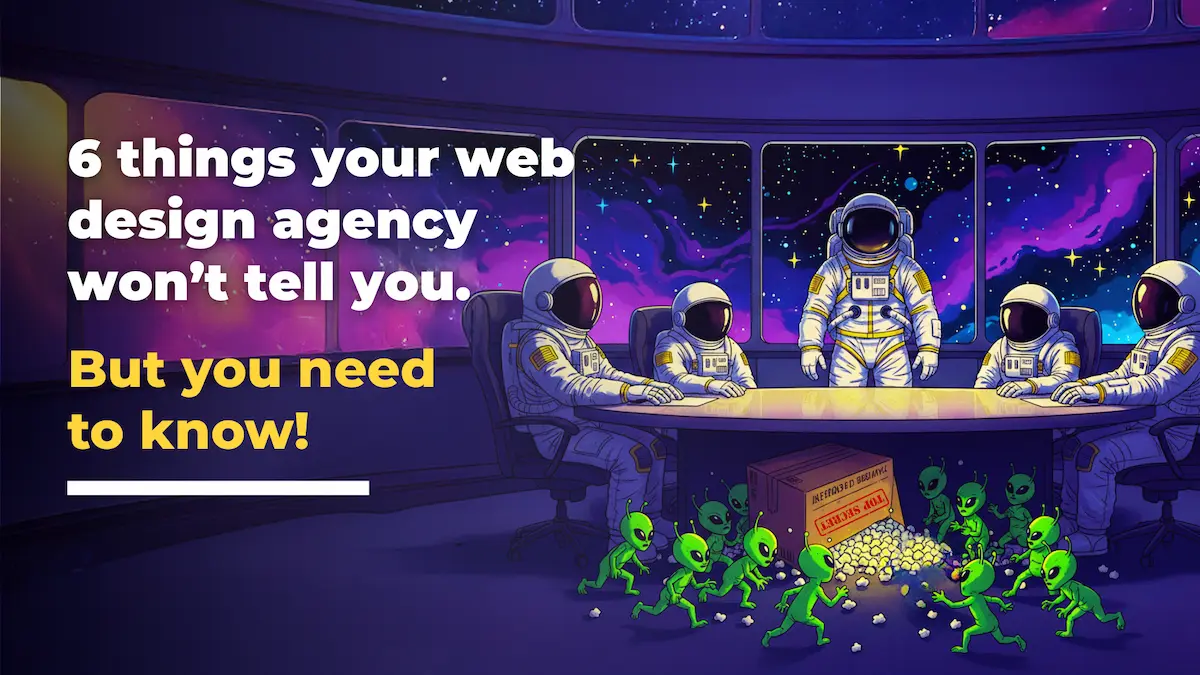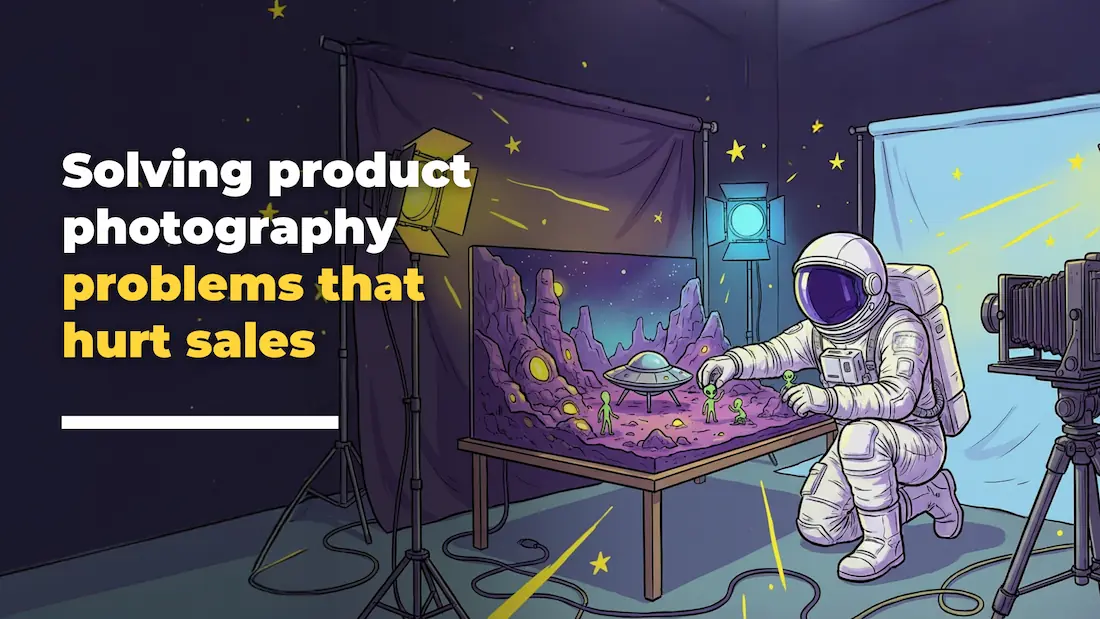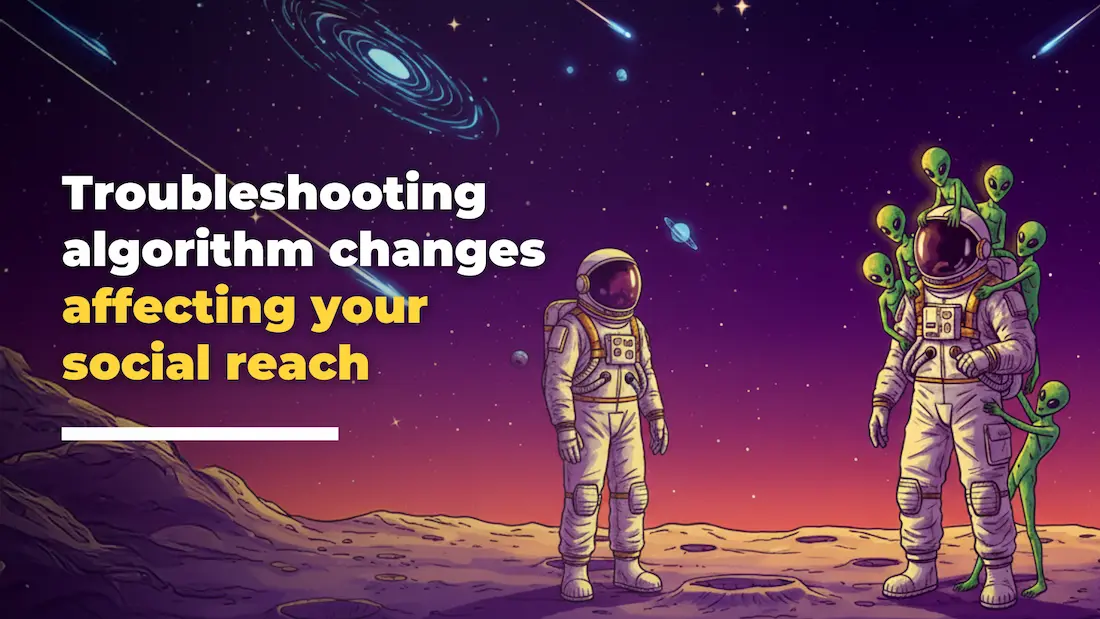(But You Desperately Need to Know)
You’ve decided it’s time. Your current website is either a digital ghost town, an outdated relic from a bygone era, or simply non-existent. You’ve done your research and understand that a professional, high-performing website should be an engine for modern business growth, so you start the search for a new web design agency. What’s next?
Agencies will talk your ear off about frameworks, platforms, and aesthetics. They’ll promise you a “beautiful,” “stunning,” and “responsive” website. And while that all sounds great, you’re left with a nagging feeling of unease. You’re an expert in your field, but you’re not a web design expert. You’re forced to trust, and you’re terrified of making a multi-thousand-dollar mistake.
The truth is, what most web design agencies sell is not what actually grows a business. They sell the easiest thing to show: a pretty picture. The most critical elements—the strategy, the messaging, the performance metrics—often go unmentioned.
We believe in replacing that confusion and uncertainty with a clear, strategic process. So, we’re pulling back the curtain. Here are the six most important things your web design agency probably won’t tell you, and the questions you need to ask to protect your investment and build a website that truly works.
1. “A beautiful design means nothing without a strategy.”
What they won’t tell you: That the stunning design they’re pitching is functionally useless if it isn’t built on a solid foundation of business strategy. They’ll focus on the visual “wow” factor because it’s easy to sell and gets an immediate emotional reaction.
Why it matters to you: A website without a strategy is like a beautiful car with no engine. It might look impressive sitting in the driveway, but it won’t take you anywhere. Without a deep understanding of your Ideal Customer Profile (ICP), their pain points, and the specific journey you want them to take, your website becomes a passive digital brochure instead of an active lead-generation machine. You’ll get compliments on the design, but your bottom line won’t budge.
What you should ask: “Before we talk about colours and layouts, can you walk me through your process for understanding my business goals and my ideal customer?”
What you want to hear: A great partner will be thrilled you asked this question. They should describe a “discovery” or “strategy” phase that comes before any design work. They’ll talk about defining user personas, mapping out user journeys, analyzing competitors, and establishing key performance indicators (KPIs). They should be more interested in your business challenges than their design awards.
2. “Your content is more important than our code.”
What they won’t tell you: That the single biggest bottleneck in nearly every web design project is the client providing the content (the text, images, and videos). Many agencies will put a placeholder line in their contract that says “Client is responsible for all content” and then wait for you to deliver it, stalling the project for weeks or months.
Why it matters to you: You are not a professional copywriter. Writing for the web is a specific skill that involves understanding SEO, user experience, and conversion-focused language. When you’re tasked with writing all the content, you either delay the project indefinitely or provide copy that is weak and ineffective. The result is a beautifully designed container holding a muddled message that fails to connect with your audience.
What you should ask: “What is your process for content development and brand messaging? Do you offer copywriting and content strategy services?”
What you want to hear: A true strategic partner understands that design and content are inseparable. They should have a clear process for this. The best agencies offer professional copywriting and messaging services as a core part of their process. They’ll have a system for interviewing you to extract your expertise, then translating that knowledge into compelling, customer-focused language. They provide the creative spark to execute the plan with excellence.
“The truth is, what most web design agencies sell is not what actually grows a business.”
3. “SEO isn’t an ‘add-on’ you can sprinkle on later.”
What they won’t tell you: Many agencies treat Search Engine Optimization (SEO) as an afterthought—a separate “package” you can buy after the site is built. This is a fundamentally flawed approach that undermines your website’s potential from day one.
Why it matters to you: Effective SEO is not a last-minute seasoning; it’s baked into the very foundation of the cake. It dictates the site’s structure, its URL naming conventions, its page hierarchy, its loading speed, and its mobile-friendliness. Building a website without considering SEO is like building a beautiful retail store with no roads leading to it. You’ll have a fantastic destination that no one can find. Tackling SEO after the launch often requires costly and time-consuming foundational changes.
What you should ask: “How is SEO integrated into your web design process from the very beginning, not as an afterthought?”
What you want to hear: A knowledgeable agency will talk about how their strategy phase includes keyword research and competitor analysis. They should explain how this research informs the sitemap and page structure. They should mention things like technical SEO, schema markup, mobile-first indexing, and creating a content strategy that aligns with what your ideal customers are searching for.
4. “The launch is the starting line, not the finish line.”
What they won’t tell you: The project plan they present you with has a definitive end date: “Website Launch.” To them, the project is over once the site goes live. They get the final payment and move on to the next client.
Why it matters to you: A modern website is not a static object like a printed brochure; it is a dynamic, living business asset. The day your site launches is the day you finally start getting real-world data about how users interact with it. Are they clicking on your main call-to-action? Are they dropping off on a specific page? This data is pure gold, but only if you use it to iterate, test, and improve. A website that isn’t continuously optimized will inevitably see its performance decay over time.
What you should ask: “What does our partnership look like after the website launches? What is your process for analyzing performance and making ongoing improvements?”
What you want to hear: A growth-focused partner will see the launch as the beginning of the real work. They should talk about setting up analytics and tracking goals (like form submissions or phone calls). They should offer ongoing partnership plans that include regular performance reviews, A/B testing, and conversion rate optimization (CRO) to ensure the website’s value increases over time.
5. “That cheap template will cost you a fortune in the long run.”
What they won’t tell you: To keep their prices low and their turnaround times fast, many agencies build websites on cheap, off-the-shelf templates or bloated, multi-purpose themes. They customize the colours and fonts and call it a “custom design.”
Why it matters to you: While a template might look good on the surface, it can be a technical nightmare. These themes are often loaded with unnecessary code (“code bloat”) that dramatically slows down your website—a major factor that hurts both your Google rankings and your user experience. They can also have security vulnerabilities and be incredibly difficult to customize beyond their original layout, locking you into a rigid design that can’t adapt as your business grows.
What you should ask: “Do you build websites from scratch based on our strategy, or do you customize pre-built templates and themes? What is your approach to site speed and clean code?”
What you want to hear: A high-quality agency will be proud to explain their development philosophy. They should talk about building clean, lean, custom sites tailored specifically to the project’s strategic goals. They should emphasize their focus on performance, security, and creating a flexible foundation that can evolve with your business.
6. “We don’t really know how to measure success.”
What they won’t tell you: They will happily send you a report showing that your website got more “traffic” or “hits.” They use these vanity metrics to create the illusion of success. But they won’t, or can’t, connect that traffic to actual business results.
Why it matters to you: Traffic is meaningless if it doesn’t convert. You don’t need more visitors; you need more qualified leads, more sales, and more customers. An agency that doesn’t define and track business-centric metrics is not being held accountable for the results. You’re paying for an activity (building a website), not an outcome (growing your business).
What you should ask: “How will we measure the success of this project? What specific KPIs will we be tracking to determine if the website is providing a positive return on investment?”
What you want to hear: A results-driven partner will welcome this conversation. They will work with you to define what success looks like for your business. They will talk about tracking metrics like conversion rates, cost per lead, lead quality, and customer acquisition cost. They will set up dashboards and reports that clearly show how the website is performing against the goals you established in the strategy phase.
From Frustrated Business Owner to Empowered Partner
Choosing a web design agency doesn’t have to be a leap of faith. By asking these questions, you shift the conversation from a superficial discussion about aesthetics to a substantive one about business growth. You move from being a passive client to an empowered partner.
Your website is the single most important asset in your marketing system. Don’t entrust it to someone who is just going to give it a pretty coat of paint. Find a partner who will help you build a powerful, strategic engine for growth.
Ready to have a different kind of conversation about your website? Let’s talk about a strategic process that replaces confusion with clarity and delivers real results.





